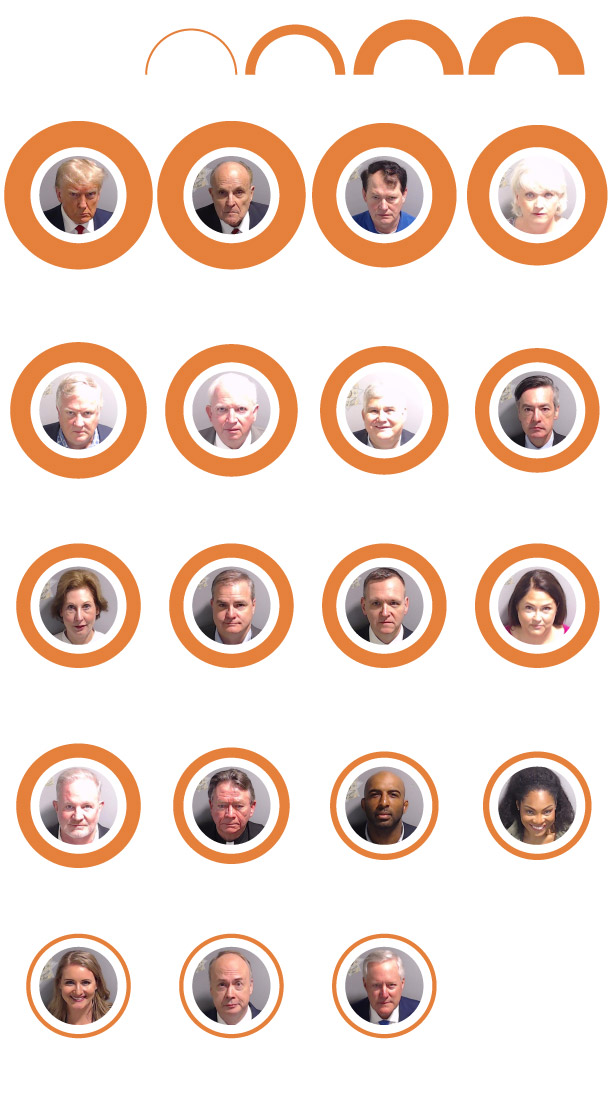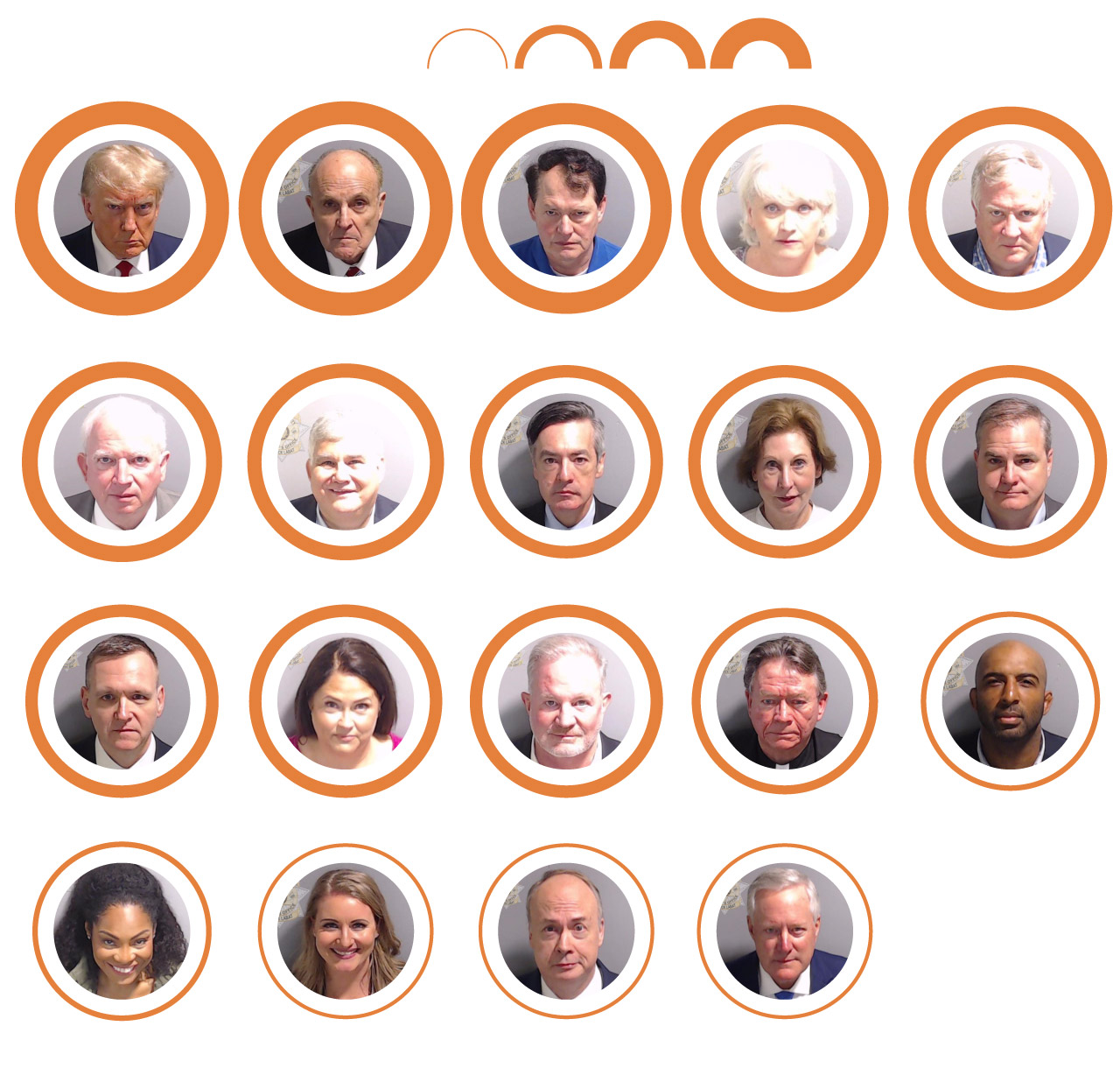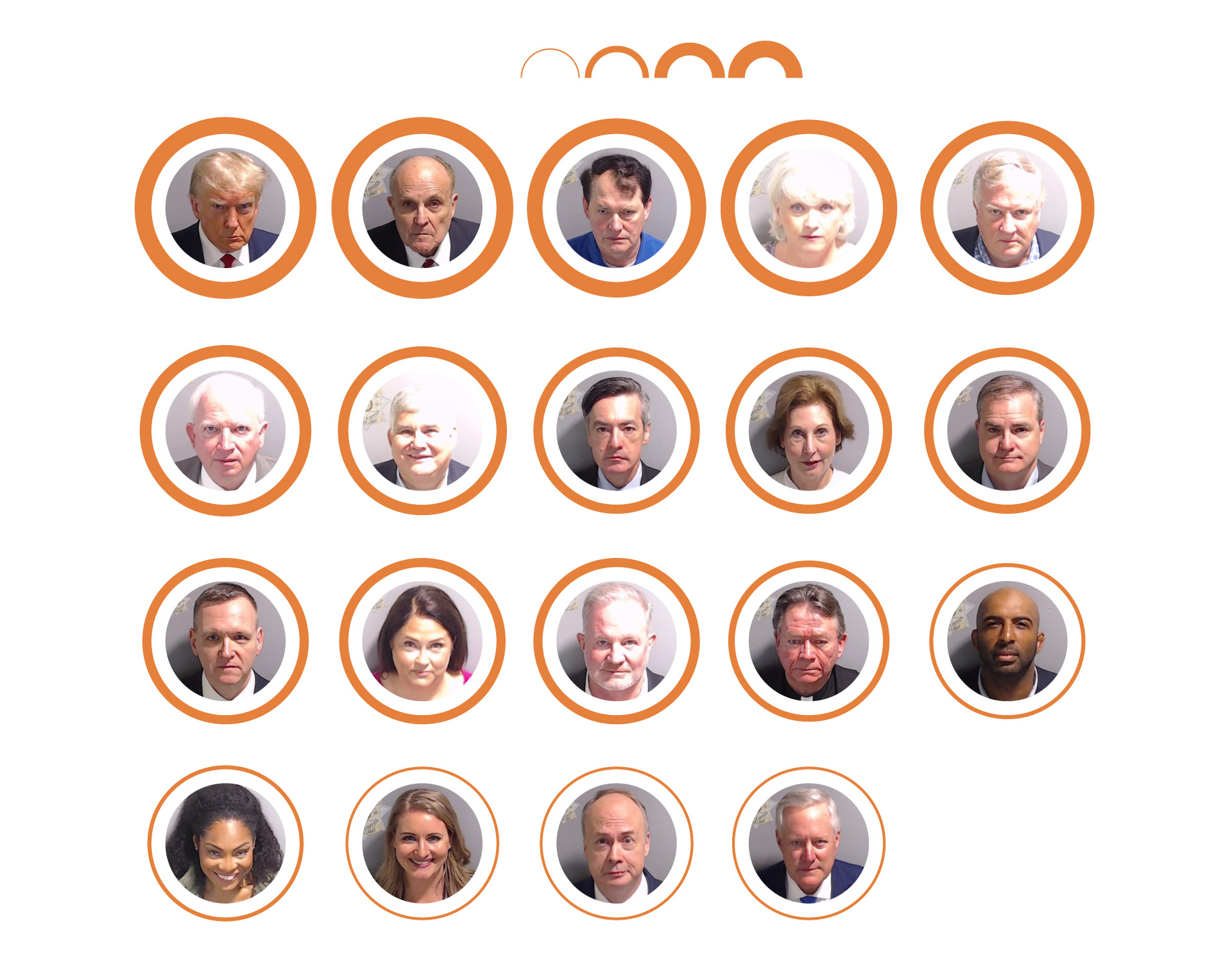The Georgia 2020 election-interference indictment is wide in scope. The case, brought by Fulton County District Attorney Fani T. Willis, includes activity spanning more than two years and encompasses multiple efforts to try to overturn former president Donald Trump’s loss in Georgia.

Number of
charges
1
5
10
13
13 Donald
Trump
13 Rudy
Giuliani
12 Ray
Smith
11 Cathy
Latham
10 Robert
Cheeley
9 John
Eastman
8 David
Shafer
7 Kenneth
Chesebro
7 Misty
Hampton
7 Sidney
Powell
7 Shawn
Still
7 Mike
Roman
3 Trevian
Kutti
7 Scott
Hall
5 Stephen
Lee
3 Harrison
Floyd
2 Jenna
Ellis
2 Jeffrey
Clark
2 Mark
Meadows

Number of
charges
Number of
charges
1
1
5
5
10
10
13
13
13 Rudy Giuliani
13 Donald Trump
12 Ray Smith
11 Cathy Latham
10 Robert Cheeley
7 Kenneth Chesebro
7 Sidney Powell
7 Shawn Still
9 John Eastman
8 David Shafer
7 Mike Roman
7 Misty Hampton
7 Scott Hall
5 Stephen Lee
3 Harrison Floyd
3 Trevian Kutti
2 Jenna Ellis
2 Jeffrey Clark
2 Mark Meadows

Number of
charges
1
5
10
13
13 Rudy Giuliani
13 Donald Trump
12 Ray Smith
11 Cathy Latham
10 Robert Cheeley
7 Kenneth Chesebro
7 Sidney Powell
7 Shawn Still
9 John Eastman
8 David Shafer
7 Mike Roman
7 Misty Hampton
7 Scott Hall
5 Stephen Lee
3 Harrison Floyd
3 Trevian Kutti
2 Jenna Ellis
2 Jeffrey Clark
2 Mark Meadows
All 19 individuals, from a county-level election official all the way up to the former president and attorneys aligned with his 2020 campaign, are charged under Georgia’s racketeering law.
All have pleaded not guilty and waived their rights to in-person arraignments that were scheduled for this week.
Here’s a look at the five schemes detailed in the indictment, and who has been charged for their involvement in each:
Seven defendants were charged with making false statements to the state legislature or other authorities

1 Trump
3 Giuliani
2 Smith
Latham
Chesebro
2 Cheeley
1 Eastman
1 Shafer
Hampton
Powell
Still
Roman
Kutti
Hall
Lee
Floyd
Ellis
1 Clark
Meadows

Latham
3 Giuliani
1 Trump
2 Smith
2 Cheeley
Chesebro
Powell
Still
1 Eastman
1 Shafer
Roman
Hampton
Hall
Lee
Floyd
Kutti
Meadows
Ellis
1 Clark
In the weeks and months following Trump’s 2020 loss, he and his allies tried to persuade several officials that they could legitimately challenge the results of the election. The indictment cites false statements made to the state legislature, in a court filing and, in one case, directly to the special grand jury.
In December 2020, Trump attorney Rudy Giuliani and attorney John Eastman appeared before the Georgia state legislature to make the case. Giuliani argued there was “ample evidence” that the election was conducted fraudulently, and as a result, the legislature could lawfully take over the appointment of electors.
Giuliani attacked those who brought the indictment against Trump in a statement soon after being charged, saying the charges had “the purpose of framing President Donald Trump and anyone willing to take on the ruling regime.” Eastman attorney Harvey Silverglate called the indictment a “legal cluster-bomb” that Eastman would challenge.
Robert Cheeley, an attorney in Fulton County who is also charged, appeared before the Georgia Senate claiming the results of the election could not be trusted. He also faces a perjury charge for allegedly making false statements to the special grand jury while under oath.
Jeffrey Clark, an attorney in the Justice Department, circulated a letter among Justice higher-ups that suggested the Georgia legislature address “significant concerns” about the results in the state.
11 defendants were charged in a scheme to appoint an alternate slate of electors

6 Trump
9 Giuliani
9 Smith
4 Latham
7 Cheeley
7 Eastman
6 Shafer
6 Chesebro
Hampton
Powell
6 Still
6 Roman
Hall
Lee
Floyd
Kutti
Clark
Meadows
1 Ellis

9 Giuliani
6 Trump
9 Smith
4 Latham
7 Cheeley
Powell
6 Chesebro
6 Still
7 Eastman
6 Shafer
Hampton
Hall
Lee
Floyd
6 Roman
Kutti
Clark
Meadows
1 Ellis
A key part of the push to overturn Trump’s loss in Georgia involved efforts to assemble a pro-Trump slate of electors who could be recognized on Jan. 6, 2021, an idea first pitched by attorney Kenneth Chesebro. Robert Sinners, with instruction from his boss Mike Roman, wrote to Trump’s designated electors to coordinate a meeting where they could certify themselves as duly elected.
On Dec. 14, the electors met just down the hall from the legitimately appointed electors for Joe Biden. David Shafer, the Georgia Republican Party chair, ran the meeting and certified himself as a state elector, as did the state GOP’s finance Chairman Shawn Still, Coffee County Republicans’ Chairwoman Cathy Latham and others.
Involvement in the alternate electors scheme resulted in a range of charges, including making false statements, forgery and impersonating a public officer.
Four defendants were charged with accessing election equipment without authorization

Trump
Giuliani
Smith
6 Latham
Cheeley
Eastman
Shafer
Chesebro
Still
Roman
6 Hampton
6 Powell
Kutti
Lee
Floyd
6 Hall
Ellis
Clark
Meadows

Giuliani
Trump
Smith
Cheeley
6 Latham
Chesebro
Still
Eastman
Shafer
6 Powell
Roman
Lee
Floyd
6 Hampton
6 Hall
Kutti
Ellis
Clark
Meadows
A third prong of the efforts to overturn the 2020 results focused on alleged irregularities in rural Coffee County in southern Georgia. Among those charged were Latham and Misty Hampton, an elections supervisor in Coffee County. Hampton raised concerns about the integrity of voting machines there, which quickly caught the attention of Trump’s circle. Sidney Powell, an attorney for Trump at the time, helped organize an effort to improperly access the voting machines with help from Latham, Hampton and Scott Hall, who was connected to Trump’s campaign.
Defendants who participated face charges such as conspiracy to commit election fraud, conspiracy to commit computer trespass, conspiracy to defraud the state and others.
Three defendants were charged with harassing election workers

Trump
Giuliani
Smith
Latham
Cheeley
Eastman
Shafer
Chesebro
Hampton
Powell
Still
Roman
4 Lee
2 Floyd
2 Kutti
Hall
Ellis
Clark
Meadows

Giuliani
Trump
Smith
Latham
Cheeley
Chesebro
Powell
Still
Eastman
Shafer
Roman
Hampton
Hall
4 Lee
2 Floyd
2 Kutti
Ellis
Clark
Meadows
Ruby Freeman, an election worker in Fulton County, and her daughter Shaye Moss, were harassed after Trump and Giuliani claimed Freeman and Moss had brought “suitcases” of illegal ballots to improperly change the results of the election. Stephen Cliffgard Lee, a pastor from a Chicago suburb, went to Freeman’s home and knocked on the her door until Freeman called 911. After Freeman refused to talk with him, he recruited Harrison Floyd and Trevian Kutti — the former publicist for R. Kelly and associate of Ye, the rapper formerly known as Kanye West — who pressured Freeman to confess to committing election fraud or go to jail.
All three defendants were charged with influencing witnesses and conspiracy to commit solicitation of false statements. Lee also faces two charges of criminal attempt to commit influencing witnesses.
Trump and his chief of staff were charged for phone calls pressuring officials

5 Trump
Giuliani
Smith
Latham
Cheeley
Eastman
Shafer
Chesebro
Powell
Still
Roman
Hampton
Lee
Floyd
Kutti
Hall
Ellis
Clark
1 Meadows

Giuliani
5 Trump
Smith
Latham
Cheeley
Chesebro
Powell
Still
Eastman
Shafer
Roman
Hampton
Hall
Lee
Floyd
Kutti
Ellis
Clark
1 Meadows
Trump and Mark Meadows, the White House chief of staff at the time, both participated in phone calls pressuring state officials to overturn the results, including Trump’s January phone call to Georgia Secretary of State Brad Raffensperger in which he pressured Raffensperger to “find” the votes necessary to overturn Biden’s win the in state.
Meadows defended his involvement in the call, claiming that as chief of staff it was necessary he participate in many calls. He is seeking to move his case from state to federal court, claiming that he was acting as a federal officer.
Photos from Fulton County Sheriff’s Office.